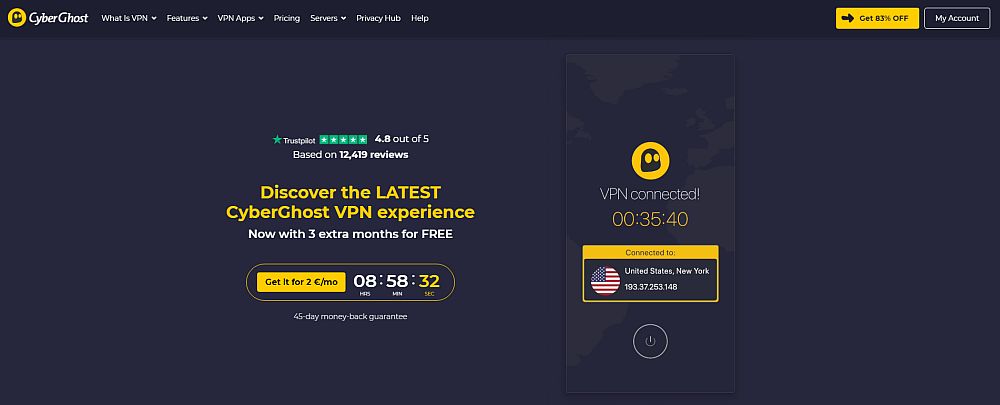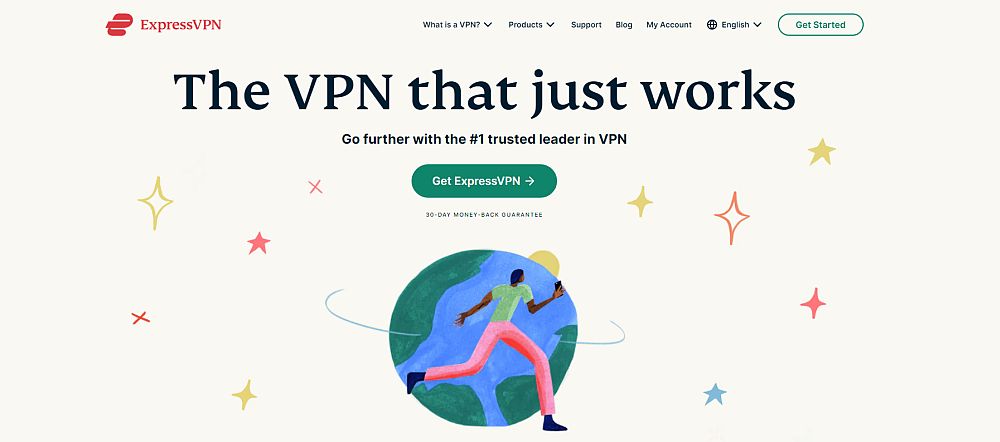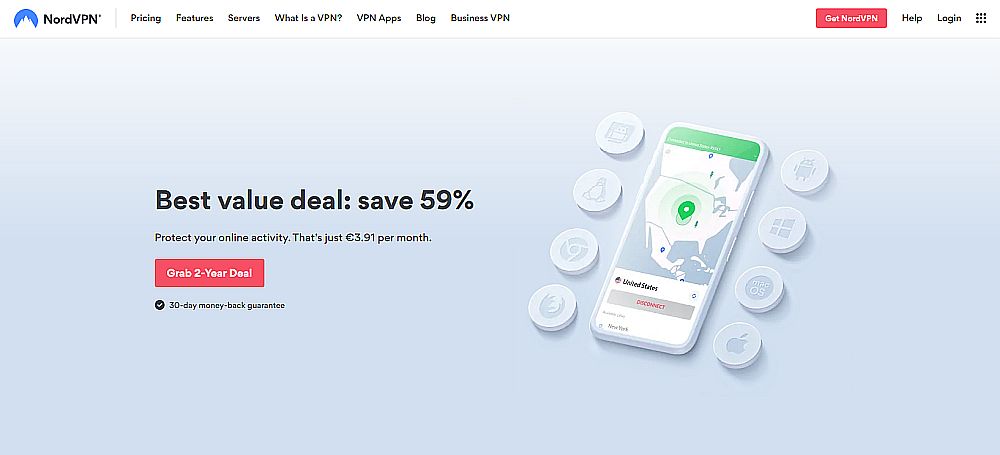The days where the average person can ignore cybersecurity are gone. Whether it’s snooping ISPs, overreaching governments, or neighborhood-unfriendly hackers, everyone has a stake in making your privacy online a little less private. But with the best virtual private networks on your side, you can encrypt your data and anonymize your Internet activity. This makes you essentially invisible as you download, stream, browse, and chat. Stick around, as we’ll show you just how easy it is to get started with the right VPN below.
The Privacy Problem
Your ISP can–and does–log anything you do online, then sells that information to advertisers or whoever else is at the bidding table. This means knowing what sites you visit, how long you stay there, what you see, and guessing what you like. Anything that goes into your browser and anything you do online, including your home address, phone number, and whatever else you put into your computer is not to be considered private. The basic claim is that the ISPs allow you to transmit and receive information, and so they can use it for profit. It’s a massive invasion of privacy, of course, but that’s just the cost of doing business in the digital age so far as policymakers and lobbyists are concerned. Moreover, with Ajit Pai’s effective repeal of Net Neutrality, the door is wide open to ISPs pushing Internet fastlanes. If you’re not familiar with the term, imagine your ISP charging you different rates based on what you intend to do online. Facebook? That’s an extra monthly charge. Want bandwidth sufficient for HD Netflix streams? Yeah, you’re gonna have to pay for that too–beyond what you already pay to Netflix, to boot. Sounds like a dumpster fire, right? Well, fortunately, there’s something you can do about it: Anonymize your Internet connection with a virtual private network.
What Is a VPN?
First, what is a VPN? In the simplest terms, it’s a cybersecurity tool that you can install via apps for your PC, smartphone, router, gaming console, and other Internet-connected devices. While different VPNs have different features, they all offer the same two core services: Why is this beneficial? The encryption makes it nigh impossible to crack into your Internet connection via brute force. Seriously, this isn’t empty marketing BS. The standard 256-bit AES encryption cipher ubiquitous to the best virtual private networks is endlessly complex; there isn’t enough computing power on planet Earth to break through.
Spoofing Explained
Because you’re establishing a secure link between your computer and a VPN server, you can potentially relay your data anywhere in the world. The only thing your ISP sees is a stream of garbled nonsense due to the heavy encryption. Because there are so many legitimate uses for encryption such as banks and secure payment portals, they’re forced to give your traffic a green light. Once your data reaches the VPN server, it’s then rebadged with a new IP address that matches the location of the server. Connecting to a server in London, for example, would allow you to pass as a Brit so far as UK-based websites are concerned. Thus, you’d get instant access to normally exclusive content like the BBC iPlayer without ever leaving your home. It’s kind of like forging a digital passport, allowing you to explore the free and open Internet the way it was meant to be. In other words, you can pretend to be in a different country online at the click of a button. So sure, a VPN will allow you to watch foreign Netflix libraries, play on gaming servers across the world, or snag regionally exclusive deals online. But, encrypting your connection and hiding (aka “spoofing”) your IP address has many more important applications.
How Anonymity Online Keeps You Safe
Your new IP address is, in most cases, shared with anyone else using the same VPN server as you. This intrinsically anonymizes your traffic, as there’s nothing to tell you apart from hundreds or thousands of others. And as the vast majority of cyberattacks rely on your IP address to target you, this is huge for covering your ass online. It also works extremely well to stop ISP tracking cold. They, nor anyone else can see who you are, or what you’re doing on their network. Yes, your ISP could still throttle you back if you exceed your bandwidth quota. But, they wouldn’t be able to throttle you back because your local government doesn’t like the political criticisms you post on your blog. Similarly, ISPs can’t overcharge for “too much” 4K streaming because they have no idea what you’re actually doing; they’re obligated to give you the benefit of the doubt. (Skeptical about that last part? Imagine if they throttled, say Bank of America or Goldman Sachs’ encrypted traffic “just in case”. Can you imagine the legal fallout from pissing off a financial giant like that? Yeah, it’s not something most ISPs want to deal with–and VPNs play this reality to your benefit.)
How to Choose the Right VPN
VPNs are not all created equal. Though they can claim to offer privacy via encryption, they can still log your usage metadata, and then turn around and profit from it as quickly as an ISP. To avoid having the exact same problem that you’d have with a nosy ISP, you need a VPN that specifically doesn’t log your data. This means that they have no records of anything you do. Even if you were to do something illegal, such as download a BitTorrent or visit a website deemed “unsafe” by draconian authorities, the VPN has no record of your activity, so they can’t tell anyone about it. Your anonymous browsing, thus, isn’t truly secure without a no-logging guarantee, period. Be careful to avoid free and sketchy-quality VPNs, as well. Their logging policies are often a joke if they exist at all, and their encryption methods may be outdated or compromised. There are even proxy services which masquerade as VPNs, but do little more than reroute your data through insecure servers while bombarding you with ads along the way. Beyond privacy, low-quality providers often yield abysmal performance. Increased latency, connection dropouts, and app crashes are all common to so-called “free” VPNs. Remember the old Internet adage: if it’s free, YOU’RE the product. If a VPN isn’t asking you to pay a fee, they’re making their money off you in other ways. And you can bet they’re not reinvesting the bulk of those profits into their server infrastructure or otherwise improving the user experience of their product.
The 5 Best Virtual Private Networks on the Market
It’s hard to say which is the single best VPN provider for a given user. After all, you want to match the tool to the task, and some providers excel in some spheres and not others. Nevertheless, there a few clear winners have emerged over the years, and offer tremendous value to the widest number of use-cases. Below, we review the five best virtual private networks, leaving you to decide which is the best fit for your needs. Each offers exceptional privacy and performance for the price, so don’t stress too much about choosing one!
1. NordVPN
NordVPN is the grandaddy of the VPN industry, but don’t be fooled into thinking they’re yesterday’s tech. In fact, they’ve recently launched a proprietary encryption method known as NordLynx, which offers unbreakable 256-bit encryption and fast, low-latency tunneling. Moreover, NordVPN is continually rolling out new servers so that more people around the world can have access to the best virtual private network connections at a click. At the time of writing, their network numbers 5400+ servers across 59 countries, though that number grows all the time. Also baked into the network is a variety of specialty servers optimized for use-cases such as P2P file sharing, anti-DDoS protection, Onion over VPN for crawling the Dark Web via Tor, and many more. No matter what you do with NordVPN, you do it in complete anonymity thanks to their independently audited no-logging policy.
2. Surfshark
Surfshark is a relative newcomer to the VPN scene, but they’re already making waves as one of the fiercest defenders of consumer privacy on the market. Of course, it stands alongside some extremely capable providers that have been in the business for much longer, so Surfshark does things a little differently to stand out. First, they don’t limit the number of simultaneous connections you can have under a single subscription. This dovetails nicely with Surfshark’s slash-rate pricing, which undercuts pretty much all the rest. That doesn’t mean there’s a compromise to security–quite the opposite. It’s just that Surfshark does away with a lot of legacy encryption protocols like SSTP in favor of a few modern options that “just work”, such as OpenVPN and WireGuard. And with built-in smart DNS and automatic obfuscation on every one of their 3200+ servers in 65 countries, you can even get past Netflix’s infamous proxy ban with ease. Zero logs, zero fluff; just a lean VPN you can trust.
3. ExpressVPN
For a long time, ExpressVPN was the heavyweight champion of the privacy world. And really, it’s just as good as it’s ever been if not better–it’s just a bit more expensive than the competition which has made serious strides in catching up. But, paying a premium does in this case net you truly premium service. No other VPN can claim to be as consistently fast as ExpressVPN, making it ideal for buffer-free gaming and streaming. And with the launch of their own Lightway encryption protocol, ExpressVPN can confidently layer on the protection without bogging you down with excessive encryption overhead. Each of their 3000+ servers across 94 countries benefits from continual upkeep, boasting consistent speeds and impressive uptime. Another bonus? ExpressVPN punches through the Great Firewall of China with ease. A strict no-logging policy rounds out the package.
4. CyberGhost
Every VPN has their standout feature, and for CyberGhost it’s undoubtedly their mind-bogglingly huge network. Seriously, there are over 7000 servers strewn across 91 countries! You’d have to go way out of your way to remove yourself from this VPN’s robust network coverage. CyberGhost is also extremely user-friendly despite its size. Even VPN newbies can make effective use of this cybersecurity tool to erect unbreakable encryption at a single click. Customer service is prompt and friendly, and they pride themselves on transparency with how they handle your data. Their best practices are enshrined in a solid no-logging policy, so you can torrent, chat, and binge Netflix to your heart’s content.
5. IPVanish
With zero limitations on bandwidth or data types, IPVanish is an extremely popular choice for torrenters and other forms of P2P filesharing. This provider has been around for a while, and has done everything right to engender a sense of trust–the ultimate commodity in today’s privacy-sensitive environment. No-logging.
Best VPNs: CONCLUSION
If you’ve made it this far down the page, congratulations! You now have the lay of the land when it comes to the best virtual private networks on the market. We’ve reviewed five of the most consistently great providers; any one of them will serve admirably to hide your activity online and keep you safe. Say goodbye to government spying, ISP throttling, and brute-force hacking with unbreakable, military-grade encryption on your side.
Have you used any of these VPNs? Which other providers can you personally vouch for? Let us know your thoughts in a comment below.











